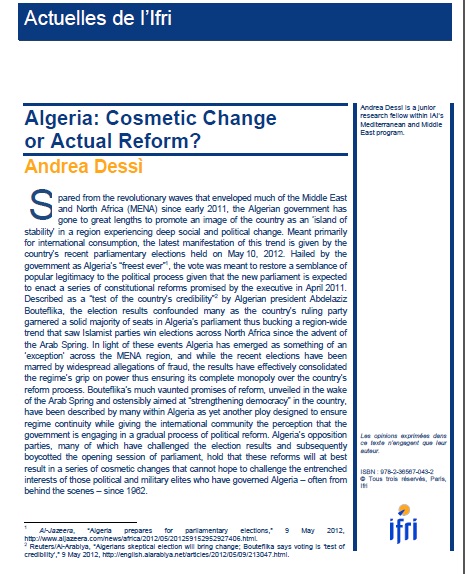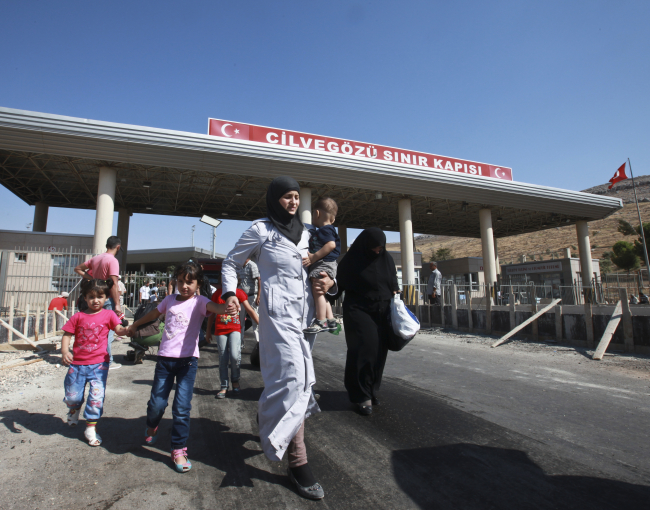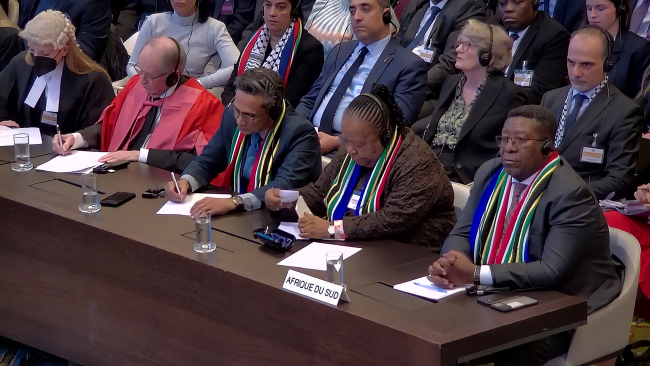Algeria: Cosmetic Change or Actual Reform?

Algeria has emerged as something of an “exception” across the Middle East and North Africa (MENA) region, and while the recent elections have been marred by widespread allegations of fraud, the results have effectively consolidated the regime’s grip on power thus ensuring its complete monopoly over the country’s reform process.
Spared from the revolutionary waves that enveloped much of the MENA region since early 2011, the Algerian government has gone to great lengths to promote an image of the country as an ‘island of stability’ in a region experiencing deep social and political change. Meant primarily for international consumption, the latest manifestation of this trend is given by the country’s recent parliamentary elections held on May 10, 2012. Hailed by the government as Algeria’s “freest ever”, the vote was meant to restore a semblance of popular legitimacy to the political process given that the new parliament is expected to enact a series of constitutional reforms promised by the executive in April 2011. Described as a “test of the country’s credibility”2 by Algerian president Abdelaziz Bouteflika, the election results confounded many as the country’s ruling party garnered a solid majority of seats in Algeria’s parliament thus bucking a region-wide trend that saw Islamist parties win elections across North Africa since the advent of the Arab Spring. In light of these events Algeria has emerged as something of an ‘exception’ across the MENA region, and while the recent elections have been marred by widespread allegations of fraud, the results have effectively consolidated the regime’s grip on power thus ensuring its complete monopoly over the country’s reform process. Bouteflika’s much vaunted promises of reform, unveiled in the wake of the Arab Spring and ostensibly aimed at “strengthening democracy” in the country, have been described by many within Algeria as yet another ploy designed to ensure regime continuity while giving the international community the perception that the government is engaging in a gradual process of political reform. Algeria’s opposition parties, many of which have challenged the election results and subsequently boycotted the opening session of parliament, hold that these reforms will at best result in a series of cosmetic changes that cannot hope to challenge the entrenched interests of those political and military elites who have governed Algeria – often from behind the scenes – since 1962.
Over a year since the outbreak of the Arab Spring, the government’s promises of political reform have yet to be implemented by Algeria’s ruling elites. While stability has thus far prevailed, Algeria’s profound imbalances in the social, political and economic realms seriously call into question the future sustainability of the Algerian regime. By analyzing the Algerian government’s promises of reform and the country’s recent parliamentary elections, the following research address the thesis of a so-called ‘Algerian exception’ and casts doubt over the regime’s genuine intentions for reform.

Available in:
Regions and themes
ISBN / ISSN
Share
Download the full analysis
This page contains only a summary of our work. If you would like to have access to all the information from our research on the subject, you can download the full version in PDF format.
Algeria: Cosmetic Change or Actual Reform?
Related centers and programs
Discover our other research centers and programsFind out more
Discover all our analysesCanada’s Recognition of a Palestinian State: What Consequences on its Foreign Policy Toward Palestine?
On September 21, 2025, Canada became the 148th of 157 countries to recognize Palestine as a state. It did this with the United Kingdom (UK) and Australia, defying the United States (US) and Israeli opposition.
How to Jumpstart Economic Recovery in Syria? The role of syrian entrepreneurs in Turkey
This report examines the potential role of Syrian-partnered companies operating in Türkiye in supporting economic recovery and reconstruction efforts in Syria. Based on data collected through field research and surveys conducted by the Economic Policy Research Foundation of Türkiye (TEPAV), the report provides an overview of the business characteristics, sectoral distribution, and cross-border economic activities of Syrian entrepreneurs. The report explores how this business activity could contribute to restoring supply chains, stimulating local production, and generating employment.
Indonesia and the Palestinian Cause
During his inaugural presidential speech on October 20, 2024, Indonesia’s incumbent president, Prabowo Subianto, iterated certain principles central to the philosophical foundation of the Indonesian nation. He noted Indonesia’s longstanding foreign policy of non-alignment or “bebas dan aktif” (free and active) and its aversion to military pacts.
Middle Power Lawfare : South Africa, International Justice, and the Gaza Crisis
The intensification of violence in Gaza following Hamas’s 7 October 2023 Al Aqsa Flood attack and Israel’s military response prompted a broader reassessment of global diplomacy. Longstanding geopolitical alignments were disrupted, and questions about humanitarian obligations, institutional accountability, and the limits of state conduct returned to the centre of international debate.









